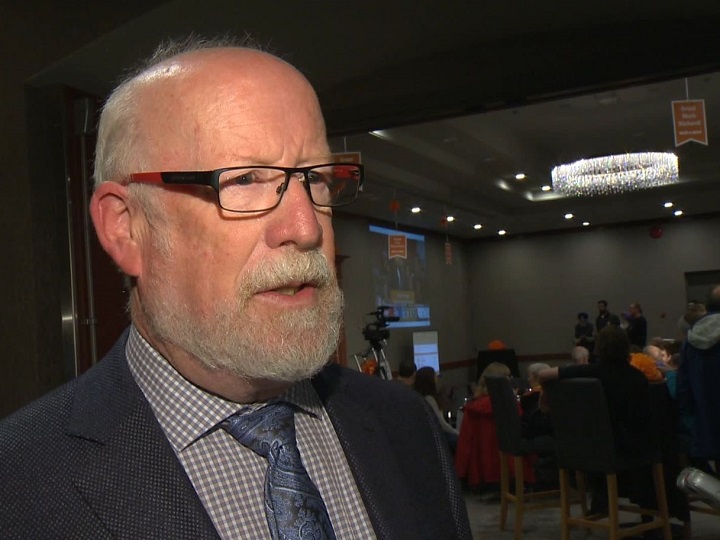A private member’s bill tabled on Tuesday seeks to draw attention to what one Member of Parliament says are insufficient environmental protections for Canada’s lakes and rivers.

On Dec. 14, NDP MP Richard Cannings introduced Bill C-214, which would amend the Canadian Navigable Waters Act.
The bill aims to add more than a dozen lakes, rivers and creeks in his B.C. riding of South Okanagan-West Kootenay to the law’s list of protected waters in an attempt to regain safeguards that were lost in the Harper-era rollback of environmental protections and never fully reinstated under the current Liberal government.
The Navigable Waters Protection Act, as it was previously known, required any construction going in, on, over, under, through or across any navigable water to receive approval from the transportation minister. Any substantial interference to the ability to navigate these waters by boat triggered an environmental assessment.
In 2012, former prime minister Stephen Harper’s Conservative government stripped this protection from 99 per cent of lakes and rivers by creating a list that initially only included three oceans, 97 lakes and 62 rivers.
Despite the Liberal Party’s promise during the 2015 federal election to “review these changes, restore lost protections, and incorporate more modern safeguards,” it neglected to relist all lakes and rivers.
Instead, after reviewing the Harper-era act in 2016, the Standing Committee on Transport, Infrastructure and Communities recommended maintaining the current list but improving the process for adding waterways “by making it easily accessible, easy to use and transparent.”

The committee also recommended a public awareness campaign “to inform stakeholders of the process.”

Get breaking National news
Now, Cannings wants to see protections reinstated for waterways in his riding.
“This (private member’s bill) was really a reminder to the government that they haven’t lived up to their promises of the 2015 election,” said Cannings.
If Cannings’ bill were to succeed, any “medium” or “major’” work impacting lakes and rivers in his riding would require approval from the Ministry of Transportation, which “essentially restores what was there prior to the Harper government” in terms of protections, says Andrew Gage, a lawyer with West Coast Environmental Law.
Gage criticizes the Liberal government’s definition of “navigable water,” particularly the fact that it hinges on a “reasonable likelihood” that a body of water “will be used by vessels as a means of transport or travel for commercial or recreational purposes, or as a means of transport or travel for Indigenous peoples of Canada.”

This definition is too narrow, he says, and raises questions about whether navigation for scientific or educational purposes is protected alongside commercial and recreational purposes.
The Liberal government’s amendments to the Harper-era version of the law also included exemptions for pipelines and transmission lines regulated by the Canada Energy Regulator, giving the federal body the power to approve such projects even if they affect navigable waters.
The Canadian Navigable Waters Act cannot apply to pipelines and transmission lines, either, under the Liberal amendments, even though these projects meet the definition of “work” outlined in the act.
Gage said the current legislation is “disappointing” and a “departmental failure.”
People and groups can approach the Ministry of Transportation and put forward reasons why certain bodies of water should be added to the schedule, but Cannings says the process seems “very cumbersome and unnecessary.”
“Why should we leave it up to individuals to protect rivers and lakes?”

In an emailed statement to Canada’s National Observer, Green Party interim leader Amita Kuttner echoed Cannings’ and Gage’s sentiment that the Liberal government has not adequately restored protections
“With escalating threats to freshwater quality and quantity due to climate change, the federal government must ensure that the integrity of Canada’s watersheds is the first priority of water protection,” reads Kuttner’s statement.
Although one private member’s bill won’t solve the long-standing problems with Canada’s protection of navigable waters, Cannings says he regularly uses private member’s bills to draw attention to issues and has seen movement as a result of them.
“In my experience, when (I’ve) tabled private member’s bills, I get contacted by the minister or the parliamentary secretary involved in that and we sit down and have a talk about what my priorities are and why I’m doing this,” he said.
“Sometimes things go nowhere, and sometimes we get things done.”
Cannings and his colleague, NDP MP Don Davies, view private member’s bills as “an idea factory for the government.”
Even bills that never make it to debate can mobilize Canadians to write to their MPs and “get people talking in the other caucuses and say, ‘This is a good idea, maybe we should do something about it,’” said Cannings.


Comments
Want to discuss? Please read our Commenting Policy first.